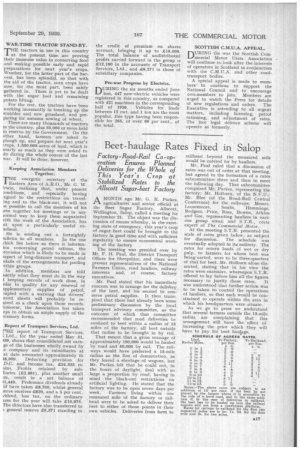Beet-haulage Rates Fixed in Salop
Page 19

If you've noticed an error in this article please click here to report it so we can fix it.
Factory-Road-Rail Co-operation Ensures Planned Deliveries for .the Whole of This Year s Crop at Stabilized Rates to the Allscott Sugar-beet Factory AMONTH ago Mr. G. K. Parkes, agriculturist and senior official at the Beet Sugar Factory, Allseott, Wellington, Salop, called a meeting for September 21. The object was the discussion of means whereby, in the existing state of emergency, this year's crop of sugar beet could be brought to the factory in good time and with sufficient regularity to ensure economical working of the factory
The meeting was presided over by Mr. F. H. Paul, the District Transport Officer for Shropshire, and there were present representatives of the National Farmers Union, road hauliers, railway interests and, of course, factory executives.
Mr. Paul stated that his immediate concern was to arrange for the deliVery of the beet, and his second tO conserve petrol supplies. It then transpired that there had already been some preliminary discussion by the local transport advisory committee, as the outcome of which that committee recommended that road deliveries be confined to beet within a radius of 13 miles of the factory, all beet outside that radius to be brought in by rail.
That meant that a gross tonnage of approximately 100,000 would be hauled by road and 50,000 by rail. The railways would have preferred a 15-mile radius as the line of demarcation, as they feared a shortage of wagons, but Mr. Parkes felt that he could not, in the hours of daylight, deal with so large a proportion by road, having in mind the black-out restrictions on artificial lighting. He stated that the factory was to be open seven days per week. Farmers living within one measured mile of the factory or rail. head were to be asked to deliver their beet to either of those points in their own vehicles. Deliveries from farm to railhead beyond the measured mile would be catered for by hauliers.
Mr. Paul ruled that a discussion of rates was out of order at that meeting, but agreed to the formation of a rates subcommittee there and then to meet the following day. That subcommittee comprised Mr. Parkes, representing the factory; Mr. Holburn, of the NF. U.; Mr. Blee (of the Road-Rail Central Conference) for the railways; Messrs. Loosemoore, Smith, Hemmings, Rodgers, Price, Rees, Bowen, Atkins and Gee, representing hauliers in various group areas; and S.T.R., costs expert of The Commercial Motor.
At the meeting S.T.R. presented the scale of rates given below, as subject for discussion. The schedule was eventually adopted in its entirety. The rates for return loads of wet or dry pulp, to farmers for whom beet was being carted, were to be three-quarters of that for beet. Mr. Holburn alone dissented, stating that in his view the rates were excessive, whereupon S.T.R. offered to lay before him all the figures necessary to justify those rates. It was understood that further action was to be taken to control the operations of hauliers, so that each would be constrained to operate Within the area in which his headquarters were situate.
As we go to press we understand that several farmers outside the 13-mile radius are complaining that this arrangement will have the effect of increasing the price which they will have to pay for beet haii,age.




















































